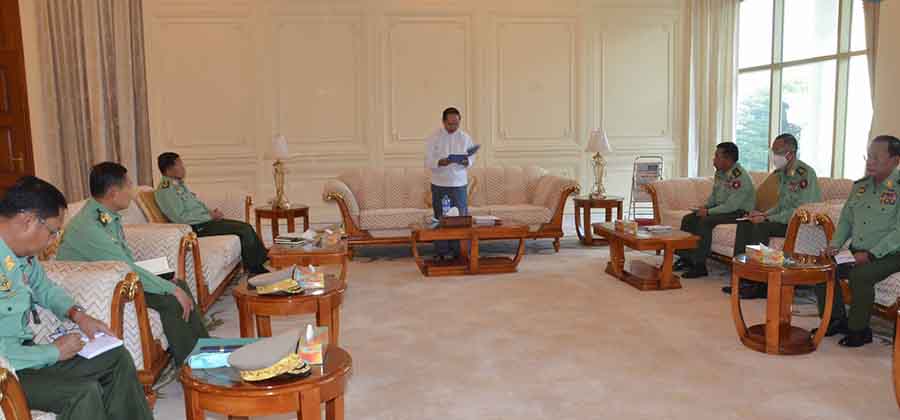Court testimony from Myanmar’s ousted civilian President U Win Myint on Tuesday showed that commander-in-chief Senior General Min Aung Hlaing breached the military’s own 2008 Constitution when he seized power on Feb. 1.
On multiple occasions over the past eight months, whether in meetings with members of the State Administration Council (SAC) he chairs, or at gatherings with his subordinates, the commander-in-chief has repeatedly claimed that there was no coup on Feb. 1 and that the military takeover was carried out “constitutionally”.
However, on Tuesday, the 70-year-old detained President, testifying in his own defense, told a court in Naypyitaw that early on the morning of the takeover, two military generals entered his room at the Presidential Residence in Naypyitaw and tried to force him to resign from his post on the grounds of ill health.
According to his lawyer, the President told the court that the officers threatened him, saying that if he did not do as they instructed he would come to “harm”.
U Win Myint told the generals that he would rather die than consent to their proposal, the lawyer added.
The President said he told the generals that he was not concerned about being harmed, and that things should be handled as per the law and not by staging a coup, his lawyer said.
The first public revelation of the circumstances of President U Win Myint’s detention came as he personally defends himself against an incitement charge brought by the regime over statements released by his National League for Democracy (NLD) urging the public to resist the coup.
The same charge has also been brought against detained State Counselor Daw Aung San Suu Kyi, the NLD chairwoman, and detained Naypyitaw Mayor U Myo Aung.
A lawyer told The Irrawaddy that Tuesday’s court testimony from the President has emerged as the strongest confirmation yet of assertions made by both local and international legal experts that the military takeover was unconstitutional.
According to Article 417 and Article 418 of the 2008 Constitution, in the event that a state of emergency is to be declared in the country, the President must announce the order in coordination with the military-dominated National Defense and Security Council (NDSC). The President then transfers the government’s executive, legislative and judicial powers to the Commander-in-Chief of the Defense Forces.
However, a few hours after the country’s civilian leaders including President U Win Myint and State Counselor Daw Aung San Suu Kyi were arrested on Feb. 1, the military convened an NDSC meeting. Former general U Myint Swe, the military-appointed vice president, attended the meeting as “acting president” and declared the country to be under a nationwide state of emergency for one year. Then, he immediately transferred the country’s legislative, administrative and judicial powers to the commander-in-chief.
Trying to force the sitting president to resign by using threats could be seen as coup maker Min Aung Hlaing’s desperate attempt to make his takeover constitutional. The charter’s Article 73 (a) states that one of the two vice presidents—the one who won the second-highest number of votes in the presidential election—shall serve as Acting President “if the office of the President falls vacant due to his resignation, death, permanent disability or any other reason.”

In other words, the two senior military officers’ suggestion that U Win Myint quit his position for health reasons was nothing more than a pretext to make the coup legal.
However, given the then president’s refusal to resign, it’s hard to say that Article 73 provides valid support for U Myint Swe’s acting presidency, let alone the coup.
“The President has notified the entire nation as well as the world, through the court, that the takeover violates the Constitution,” the lawyer said.
The President’s words clearly reveal the commander-in-chief and his fellow generals to be criminals who have committed high treason, he said.
“It is the strongest evidence that they committed high treason as [it comes from] the head of state himself,” the lawyer said.
Lawyers in Myanmar have called for the prosecution of the coup leaders for high treason, which carries the death sentence.
Amid these calls, the SAC led by coup leader Min Aung Hlaing has amended the country’s high treason law in an attempt to guarantee impunity for the military leaders who seized power in February.
While the original Article 121 of the Penal Code says anyone who “attempts or otherwise prepares by force of arms or other violent means to overthrow the organs of the Union or of its constituent units established by the Constitution” is guilty of high treason, the coup leader has amended it so that only unconstitutional use of force of arms constitutes high treason, meaning it is acceptable to use force of arms as long as it is done in line with the Constitution.
However, lawyers said that because the takeover was carried out in breach of the Constitution, every order, every appointment and removal of an official, and all changes to the law made by the junta are illegal.
Myanmar has been in political and social turmoil since the military overthrew the civilian government and seized control.
Since the coup, the junta has killed at least 1,167 people including protesters, politicians, activists, bystanders and children, and arrested more than 8,890 in an effort to suppress opposition to the regime.
You may also like these stories:
International Cigarette Firm Ditches Military-Ruled Myanmar
Myanmar Junta Criticized Over Mandalay Palace Park Plan
Two Power Plants in Myanmar’s Biggest City Shut Amid Coup’s Financial Fallout

















